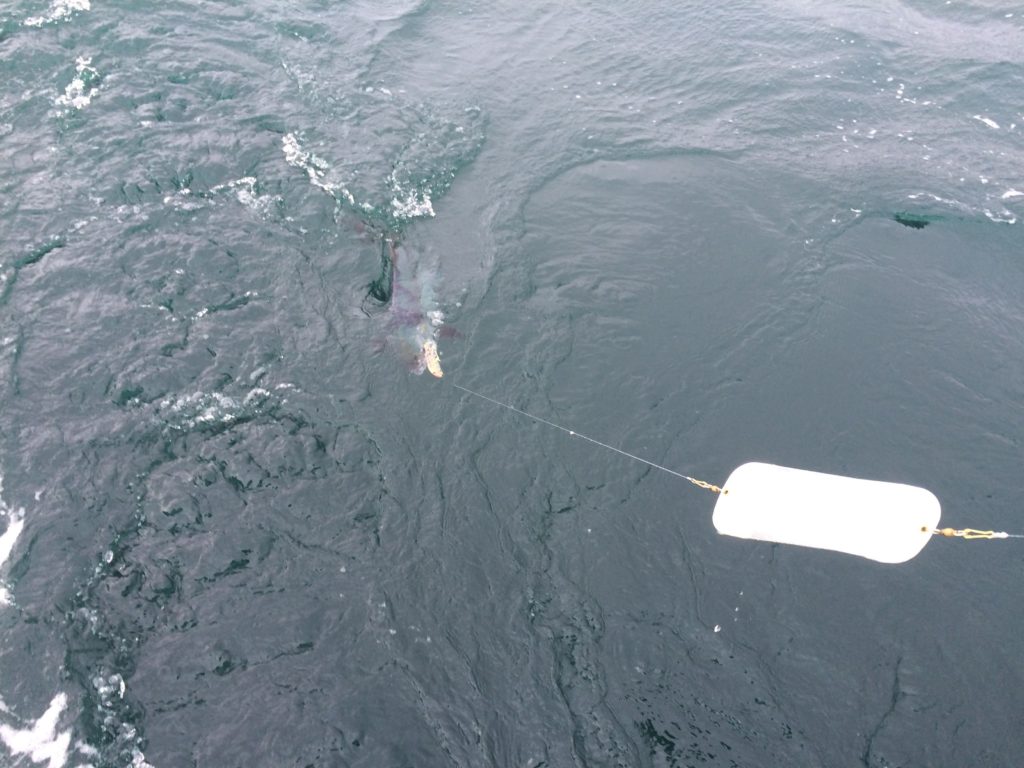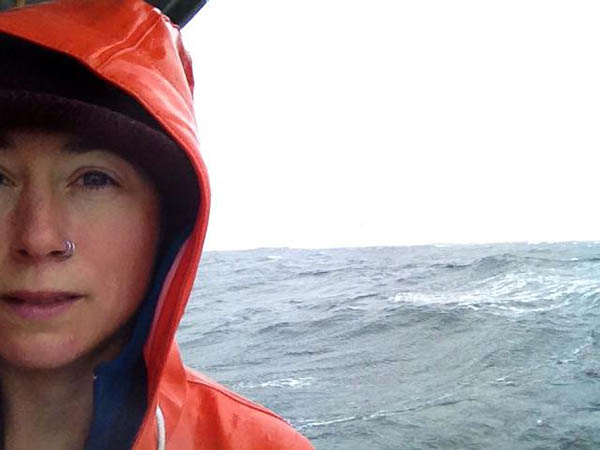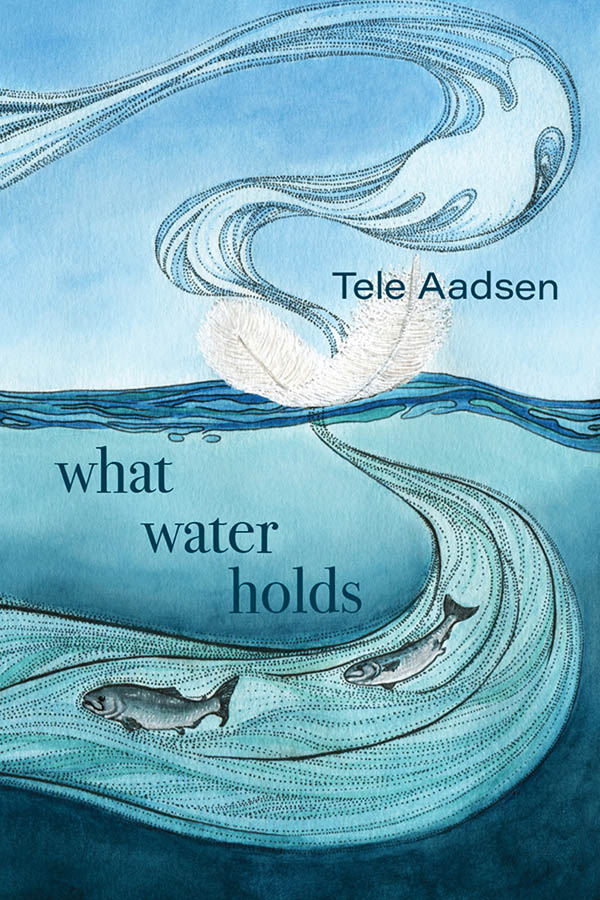For Southeast Alaska’s salmon trollers, the longest day of the year falls on July 1: opening day of Chinook salmon season.
Every July 1 finds us – two humans and our boat, the 43-foot Nerka – forty miles offshore in the Gulf of Alaska. We’ll be in our boots ‘til sundown: checking our hooks, processing the catch, handling every salmon with meticulous care. We’ll talk about our partners, Pacific Northwest chefs and grocers, who will build their own work around our harvest. Throughout the day we’ll exclaim at breaching humpbacks, a Layson albatross soaring by, a school of herring flipping on the surface. Everything is an interconnected wonder.
One hook, one fish. Following ten thousand years of First Nations’ seasonal harvests and environmental stewardship, this ethos has guided Southeast Alaska’s commercial troll fleet for almost 150 years. As second-generation fishermen proud of the conservation values regulating our work, it’s surreal to find our fishery in the Wild Fish Conservancy’s crosshairs.
On April 17, the Duvall-based organization filed an injunction in federal court to block king salmon trolling in Alaska this season, effective July 1. The injunction comes just a month after the WFC’s lawsuit against the National Oceanic & Atmospheric Administration (NOAA) for authorizing Alaska’s Chinook troll fishery, alleging troll interception as the cause of the Southern Resident orca’s nutritional deficiencies. This lawsuit addresses none of the very real threats to the Southern Resident orcas and salmon – Puget Sound’s habitat loss, pollution, dams, climate change – but instead seeks to shut down some of the hardest working advocates for salmon: community-based fisher-folks in a sustainable fishery over a thousand miles away.
Having this unfold amidst pandemic days, when everyone’s circumstances are already precarious and any sense of normalcy wildly off-kilter, has been brutal. Salmon trollers are literal mom-and-pop operations, struggling to stay afloat with little-to-no margins. The vast majority of the fleet — 85% — is comprised of Alaska residents. Southeast Alaska’s coastal communities have spent decades sacrificing to compensate for the Lower 48’s freshwater habitat destruction, illustrated by the cuts to our Chinook quota in Pacific Salmon Treaty (PST) negotiations: 35% in 1999, 15% in 2009, and at least another 7.5% in 2019. When it comes to saving Chinook salmon and the orcas that depend on them, no one has more at stake than commercial fishing families. Our livelihoods depend on healthy stocks and fisheries managed for the long-term. Conscientious consumers know this; it’s why Alaska has consistently been lauded for its “best practice” fisheries, world-renowned as a model of sustainability.
Last summer, Alaska’s trollers fished a total of seven days for kings. Eliminating the lowest impact fishery on the water will not reduce the toxicity of Puget Sound or the PCB levels responsible for “peanut-head” offspring, nor will it address the impact of the Lower Snake River dams and the rampant habitat loss caused by America’s fastest-growing metropolis. Notably, Washington’s Southern Resident Orca Task Force, expert stakeholders, isn’t backing the WFC’s lawsuit. Instead of helping orcas, this will devastate Southeast Alaska’s coastal communities and our partners across the country.
Fisherman/environmentalist: we’re old enough to remember when folks had to choose one or the other. That’s a tired trope performed by both sides, and we reject it. We are a commercial fisher-family. We are environmentalists. The WFC speaks for neither.
As harvesters, we are responsible for telling the story of our salmon. Few of our land-friends will ever watch a king salmon breach the water’s surface as dawn breaks over the Fairweather Range, but if we do our work properly, they’ll feel reverence for the fish on their plate. Only through alliances between commercial fisher-folks, conservationists, service industry professionals, tribal members, sports fishing groups, scientists, & consumers – can we hope to turn the tide for the long-term survival of the Southern Resident orcas. The WFC’s lawsuit is not the path that will get us there.

As of May 12, we still don’t know how our 2020 salmon season will unfold, waiting for a federal judge in Washington to rule on the WFC’s injunction. Please visit the Alaska Trollers Association to donate to ATA’s Legal Fund.



Thanks for the inciteful and thoughtful essay. Hoping the best for you.
Excellent explanation of the status and stakeholders positions. I assume this has a li ready been submitted to the decision makers.
On any topic I consider my opinion justified and worth having if I know that I have a diversity of opinion represented. I found your blog when I was living for five years in Alaska. We are now living in the North Cascades, and richer for our Alaskan time. I respect y0ur voice, and feel that having the insight of your thoughts helps me to hold more informed opinions. Thanks — hope you and yours weather the pandemic well.
Excellent piece, Tele and Joel. And very persuasive. Wishing the best outcome for you and the other fisherfolk.
A little knowledge is indeed a dangerous thing. Sorry to hear about this misguided application. I am confident it won’t succeed.
As a family of Canadian trollers we offer our sympathy and support. We may bicker across the border on occasion about each others’ TAC, but we are 100% with Alaska trollers in their and our ongoing struggle to defend, promote and grow our honourable and sustainable fishery.
Be safe. Stay strong.
The Bryces. Nanoose Bay, BC
Excellent explanation of the misguided suitWild Fish Conservancy has filed to stop S.E. Alaska Trollers Chinook fishery. Sadly in the past I have contributed to this organization thinking that they were pursuing a course of action that would benefit Wild Chinook stocks in Pacific NW. Unfortunately their suit will only fracture the community of people trying to restore Chinook Salmon populations.
Wow. It seems like these are crazy times for pretty much everyone. But it’s always a pleasure to read your beautiful and thoughtful writing, Tele. You are a fishing family trooper and I’m sure you will prevail.
Best wishes
Comment
There is a painful irony of our fishing on the opposite coasts and facing the same problem. I’m fishing on the East Coast for lobster, and facing almost the identical issue: a Federal judge determining that NOAA was at fault for allowing American lobstering to continue, even though not at fault for Right whale deaths. We are awaiting the legal ‘remedy’ which could be very severe. Tele and Joel, I wish you luck, and have donated to your cause, as you have done the same for ours. Together in solidarity!
Well written, as always. I like you non-combattive tone. It’s sad when people haven’t done their homework. The fisherfolk have always respected the environment that gives them their living. I admire how you all have combined keeping the environment and fish stable. Intelligent harvesting is key. I certainly hope the injunction is lifted before the season begins. Love, Aunt Lynn
Thanks for the information Tele and Joel and illuminating those of us who benefit from your sustainable fishing advocacy and practices, even us in Minnesota.
Very well stated. Unfortunately some environmental organizations go after the most vulnerable rather that combine to hit the protected places where the big faults lie.
One point I feel doesn’t get made often enough is that the salmon travel to Alaska to feed on Alaska herring. Alaska biomass gets converted to salmon, which then return to their original spawning ground. People who say Alaskans do not deserve a share of these salmon who spawn down the coast overlook Alaska’s contribution to all healthy west coast salmon stocks.
West coast salmon benefit from Alaska’s good stewardship of the ocean, and commercial fisheries are a big defender of that.
In addition, Southeast Alaska does not have any trawl fleet, making it the one of the larger non bottom contact areas in the world. Southeast also does not have much polluting industry, less with out cruise ships this summer.
It is particularly gallngand offensive to me that the WFC suit ignores the factors important to salmon restoration and eventual Southern Resident Killer Whale (SRKW) recovery. In short, to say the treaty and hence the biop inadequately considers conservation of chinook salmon and hence SRKW is factually wrong. I’m extremely glad NOAA decided to defend themselves in court against WFC’s suit. In my mind, it indicates NOAA/DOJ legal staff strongly believed they will win on merit.
I wanted to highlight language that is in the treaty that recognizes the fight to restore salmon is larger than fisheries conservation measures. The treaty explicitly identifies habitat destruction as a significant issue that both countries need to address.
The 1999 treaty included for the first time a habitat chapter, Annex E. Quoting from the Annex, “…Recognizing that protection and restoration of salmon habitat and maintenance
of adequate water quality and quantity are vital to achieving improved spawning
success, safe passage of adult and juvenile salmon and, therefore, optimum
production of important naturally spawning stocks;… ”
In addition, the 1999 treaty established the Pacific Salmon Restoration Fund to accomplish (some of) the habitat restoration the treaty recognized as necessary to restore natural spawning stocks.
The 2009 treaty continues the recognition of non-fishing factors affecting salmon populations: ” The parties agree that:…while fishing has contributed to the decline of many stocks of concern, the continued depressed status of these stocks generally reflects the long-term cumulative effects of other factors, particularly chronic habitat degradation, in some instances deleterious hatchery practices, and cyclic natural phenomena which may be exacerbated by climate change;”
While I am at it, the Magnuson-Stevens Fishery Management Act defines essential fish habitat and protects it from fisheries impacts and charges the Fisheries Councils with the responsibility to identify significant non-fisheries impacts and provide comment where there is a federal connection. The fishing community and management entities have been active in salmon restoration and habitat issues for decades. I’m just hoping that sinks into people’s heads, that fishermen are highly cognizant of the need to preserve and restore salmon habitat and demonstrate that habitat has a positive economic benefit, contrary to the notion that you have to destroy habitat to extract natural resources for profit.